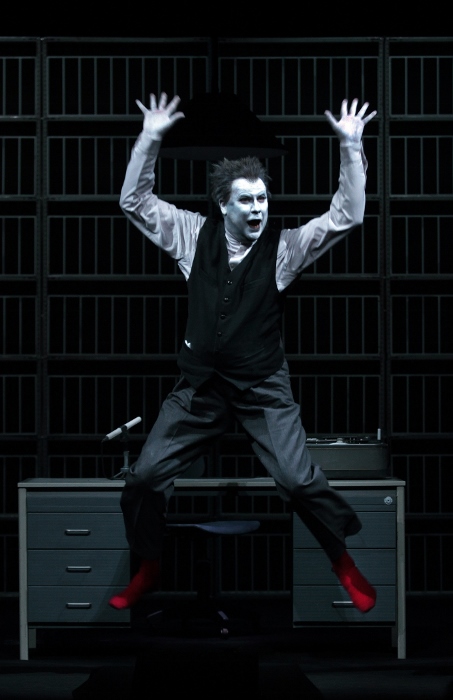
Samuel Beckett has never gone easy on the audience, and neither does Robert Wilson, whose flamboyant departure from realism presents the audience with a very different Krapp’s Last Tape, as enthralling as it is demanding. Wilson both directs and performs in this production, which has a cinematic feel, revealing vast possibilities for invention within the bounds of Beckett’s meticulous stage instructions. Performed at the Israel Festival, Wilson’s take on Beckett heralded its dramatic difference from the start, in a deep, black, silence broken by the crash and roar of thunder in the darkness. The curtain then opened on a black silhouette seated at a desk, as rain beat down in sharp slivers of light.
A lightning flash of blinding white illuminates Wilson’s version of the “wearish old man”: literally in white face, his appearance and body language at once reminiscent of the stylized stage language of Kabuki, and silent film era comedians such as Charlie Chaplin, Buster Keaton and Harold Lloyd. It’s a stage language of heightened artifice and distance, with an emphasis on ‘show, don’t tell,’ that commands the viewer’s full attention. His obligatory monochromatic vest and trousers are set off by a pair of bright red socks. Beckett’s play is the epitome of introspection, as the solitary Krapp roots about in his ledgers and recordings, listening to a tape recorded 30 years ago, on his 39th birthday. Yet unlike other productions, Wilson has chosen to employ light and sound to create an awareness of the outside, there is an entire world out there beyond Krapp’s room. A world as threatening as it is sometimes inviting, the pounding rain suggesting an imminent deluge, with all its associations.

In contrast to the worn-down look of more realistic productions, the set is all clean lines and immaculate angles, with sterile white shelves behind Krapp’s desk, suggesting a lifetime of documentation. Yet within this orderly environment, Krapp himself is a wild thing, making faces, squealing, yowling and grunting, eloquently gesturing with his hands, peeling and eating a banana with fanatic attention, dancing, and, even though he denies it, singing. Krapp’s Last Tape is a play of contrasts, contradictions, distance, and loss. There is a dizzying sense of mise en abyme as the old Krapp listens to his 39-year-old self, looking back on his younger self, the more energetic, idealistic version; as both older selves, recorded and live, erupt in derisive laughter. There is a constant tension between Krapp’s stated intentions – to cut down on the bananas, alcohol and sex, and the overwhelming urgency of those needs as he consumes a banana with defiance, or wanders behind that white wall to imbibe. His old self is gone, yet the desires and anguish of that other self are very much present. The old wounds still bleed.
Playful, precise and direct to the point of vulgarity, it is Beckett’s rejection of sentimentality that renders his work so moving. In a work that inevitably makes one think of an artist, encountering his own work, that second self, from a distance of years, as well as a commentary on identity and the quest for meaning, the choice of the protagonist’s name and eponymous title of the play, makes certain that it is impossible to discuss that play without saying Krapp all the time. One cannot but smile, and in that smile, is the redemption of the mournful clown, whose victory is in the eternal downfall that proves him right.
It is a life measured in loss, whose documentation is diligently pursued. Alone, lonely, vulnerable, vehement in his self-ridicule and denial of regret, Krapp can still kick up his heels and mock his transient pleasures. Wilson conjures an alluring and complex figure, whose grand gestures, grunting, laughing and growling self-mockery offer a contrary invitation to empathy.
Krapp’s Last Tape
Written by Samuel Beckett; Direction, Set Design and Lighting Concept: Robert Wilson; Costumes Design and Collaborator to Set Design: Yashi; Lighting Design: A.J. Weissbard; Sound Design: Peter Cerone and Jesse Ash; Associate Director: Sue Jane Stoker.
More on the Israel Festival:






Comments are closed.